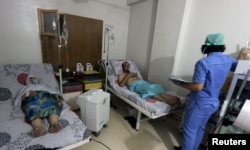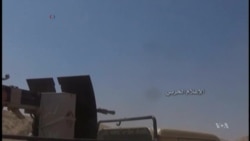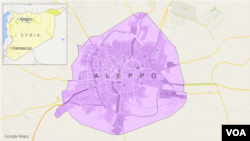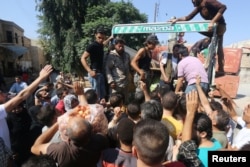Russia is willing to discuss lengthening its daily, three-hour suspension of military action in the besieged Syrian city of Aleppo, according to U.N. officials who are also investigating reports that a bomb containing chlorine gas was used by the Syrian military in the area.
The Russian military on Thursday was set to begin a daily pause in hostilities from 10 a.m. to 1 p.m. local time to allow humanitarian aid workers to bring in much-needed supplies.
But Mohammed Rasheed, a spokesman for one of the rebel groups fighting the Syrian government, told Reuters the Thursday ceasefire had not been upheld. Instead, he said, he cited an "escalation in Russian warplanes" and said government forces had tried to advance on the Ramousah district of Aleppo. A witness in Aleppo and another rebel official corroborated Rasheed's claims, Reuters reported.
The U.N. has said the three-hour window is insufficient and is trying instead to negotiate a 48-hour ceasefire to deliver aid to some 2 million people trapped in the city.
Barrel bombs dropped
Late Wednesday, a Syrian military helicopter flying over Aleppo reportedly dropped four barrel bombs – one of which was filled with chlorine gas – and killed at least three people.
In response to a question from VOA, U.N. Special Envoy for Syria Staffan de Mistura said he is unable to confirm reports that a gas was used in the attack but there is a lot of evidence that it took place.
"We have a special U.N. and other organization that are addressing that. But if it did take place, it is a war crime. And, as such, it would require everyone, all co-chairs and everyone else to address it immediately. I think the investigation is still taking place. ... But, your point is well taken. That is a war crime," he said.
The Syrian Civil Defense, a volunteer rescue organization based in Aleppo, said Thursday that 24 people were injured in the attack along with the three dead – a mother and her two children.
The British nonprofit group Syrian Observatory for Human Rights also reported the barrel bombing. It did not mention chlorine, but said that several people were having trouble breathing after the bombing.
Supplies running low
The United Nations says food and medicine stocks are running dangerously low in east Aleppo, where an estimated 300,000 people have been cut off from humanitarian assistance since early July.
In addition, escalating fighting between government and rebel forces in recent weeks has severely damaged Aleppo’s electric and water infrastructure, leaving some two million people with no access to running water and power.
U.S. General Sean MacFarland, the top commander for the coalition fighting Islamic State in Syria and Iraq, told reporters Wednesday that the humanitarian disaster in Aleppo is "a model of how I don't want to fight in Mosul [Iraq]."
"We want to conduct a campaign to liberate Mosul in a way that leaves the city largely intact and its people in good health," MacFarland said. "That does not seem to be the overriding consideration in the fight for Aleppo."









